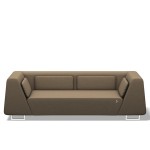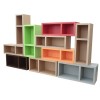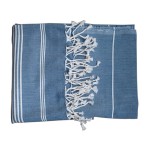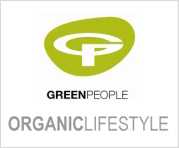Already into sustainable fashion? Now do the same for your home!
 As readers of this blog and magazine will know, eco-ethical fashion has been a hot topic in the fashion world for a number of years. With horrific incidents like Rana Plaza getting coverage across all media channels, The Clean Clothes Campaign, The Fairtrade Foundation and many others trying to educate shoppers, you are now are more informed and have more choices than ever before when it comes to updating your wardrobe. But have you ever thought about such issues when buying things for your home?
As readers of this blog and magazine will know, eco-ethical fashion has been a hot topic in the fashion world for a number of years. With horrific incidents like Rana Plaza getting coverage across all media channels, The Clean Clothes Campaign, The Fairtrade Foundation and many others trying to educate shoppers, you are now are more informed and have more choices than ever before when it comes to updating your wardrobe. But have you ever thought about such issues when buying things for your home?
Like Fashion, the homeware sector has seen a number of small retailers and manufacturers working hard to offer eco and ethical solutions for the home. The days of buying basic looking upcycled products are long gone and there are now some truly beautiful and spectacular pieces to be found. Another similarity with eco-ethical fashion, is that most of these homeware companies can be found on-line and as a result you can read about the background of the products.
 When was the last time you checked what materials your home accessories and furniture was made of and where it was made? If you buy a big piece of furniture like a sofa, you are acquiring something that should last a long time and could have a big impact on the environment. It might sounds time consuming to look into the background of everything you buy, so here are some tips to help with your decisioins without having to sacrifice time or style:
When was the last time you checked what materials your home accessories and furniture was made of and where it was made? If you buy a big piece of furniture like a sofa, you are acquiring something that should last a long time and could have a big impact on the environment. It might sounds time consuming to look into the background of everything you buy, so here are some tips to help with your decisioins without having to sacrifice time or style:
+ Check if the item is made from biodegradable materials; items such as natural textiles (cotton, wool, linen and so on), wood, bamboo or glass come from natural sources.
+ When buying fabric items, prioritise organic cotton. Most visitors to the site will know the virtues of organic cotton which does not require chemicals, therefore minimising the impact on the environment and farmers health. You can also consider alternative materials like linen, which unlike cotton, does not require watering. Or nettle, which requires no watering and no pesticides and like bamboo grows quickly. The material is very soft and does not sting! Hemp is also a great, hardwearing option.
 + Choose upcycled or recyclable homeware. Try to reduce the amount of things that end up in landfill and buy things that can be recycled or aere already upcycled. Councils nowadays will recycle most metals, glass and hard plastics, so your choice is quite broad. Upcycled homeware, like vintage or customised clothes, make for a very interesting and individual look that is hard to beat. How strange would it be if all your friends were wearing the same t-shirt as you on the same day? Yet many of use have the same book case from a certain Swedish flat pack furniture maker…
+ Choose upcycled or recyclable homeware. Try to reduce the amount of things that end up in landfill and buy things that can be recycled or aere already upcycled. Councils nowadays will recycle most metals, glass and hard plastics, so your choice is quite broad. Upcycled homeware, like vintage or customised clothes, make for a very interesting and individual look that is hard to beat. How strange would it be if all your friends were wearing the same t-shirt as you on the same day? Yet many of use have the same book case from a certain Swedish flat pack furniture maker…
+ Avoid non recyclable plastics, foams, PVC etc. Do you have any PVC clothes in your wardrobe? Try and avoid it for any purpose, be it a cheap skirt or a sofa. PVC releases dioxins, a nasty toxin which can enters the blood stream. It requires a host of additives to make it useable such as lead, cadmium or organotins*. Phthalates are used as softeners in PVC and are the world’s most common environmental pollutant. Do you like that new car smell? That is the chemicals being released from plastic and foam. If you can smell it, that means it enters your body so try to stay well clear. Your house will smell all the better for it!
+ Try to buy local or ethically made items. Anything produced in Europe will have a low carbon footprint and working conditions in Europe are generally good. If they are made outside of Europe, try to find out how they were made.
 + Go for quality over quantity. With the arrival of low cost, mass made furniture a number of decades ago, the idea that you buy a piece to treasure for a long time went out of the window. Let’s reintroduce buying well made furniture and homeware that you would still be proud to own ten or twenty years from now. Just like you can spend £3 on a Primark t-shirt that, if lucky will last a season, or £15-£20 on a well made, eco/ethical piece, consider paying a little more for a well made PEFC certified wooden table as opposed to one made from wood chip and masses of chemical glue. It will look better and last longer, meaning that in the end it will be better value for money.
+ Go for quality over quantity. With the arrival of low cost, mass made furniture a number of decades ago, the idea that you buy a piece to treasure for a long time went out of the window. Let’s reintroduce buying well made furniture and homeware that you would still be proud to own ten or twenty years from now. Just like you can spend £3 on a Primark t-shirt that, if lucky will last a season, or £15-£20 on a well made, eco/ethical piece, consider paying a little more for a well made PEFC certified wooden table as opposed to one made from wood chip and masses of chemical glue. It will look better and last longer, meaning that in the end it will be better value for money.
I hope these tips have given you some ideas of what you can do for your home. If you would like to find get great looking, eco friendly and ethically sourced homeware and furniture visit www.darwinshome.com. You will receive free shipping with voucher code ‘SWH’ on all orders over £15.
 Lizanne Jakobs is the managing director for Darwinshome.com and a passionate believer in being sustainable without having to sacrifice luxuries.
Lizanne Jakobs is the managing director for Darwinshome.com and a passionate believer in being sustainable without having to sacrifice luxuries.
* source http://www.greenpeace.org.uk/MultimediaFiles/Live/FullReport/5575.pdf
Women
A wide selection of stylish fashion clothing for all occasions including: dresses, tops, knitwear, skirts, eveningwear, coats, suits, jackets and more. Styles to suit a variety of tastes from classic to vintage and more in between: recycled and upcycled. This is sustainable ethical fashion at it's best.
Women's Ethical ClothingMen
If you're looking for something eco or ethical to wear for dress down friday, a casual weekend or holiday, you'll find it here. Tops, t-shirts, jeans, trousers from mainly fairtrade and organic cotton.
Men's Ethical FashionKids
Green fashion for kids is fun and made mainly from natural fibres including organic cotton and Fairtrade cotton. From baby to early teens, there's something to make all kids happy. Bright colours, animals, fun shapes that children can wear all year round.
Kids Green ClothingAccessories
A treasure trove of accessories from around the world can be found here. A vast selection of jewellery including necklaces, bracelets, rings and earrings to shoes, hats, bags, handbags and scarves. Whatever your style, these items will complete any outfit.
Eco-Friendly Accessories





Comments are closed.